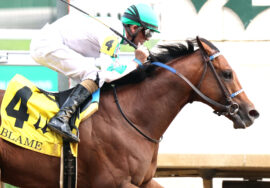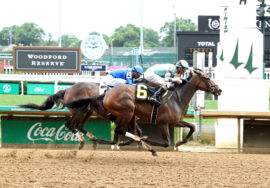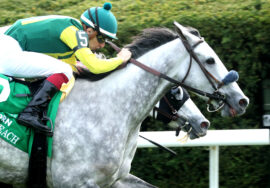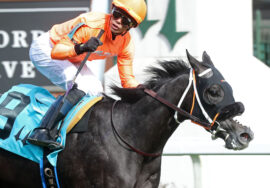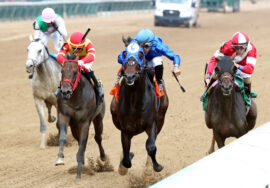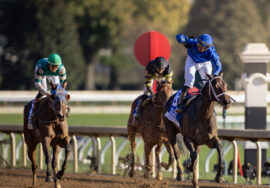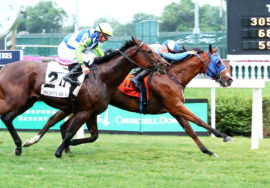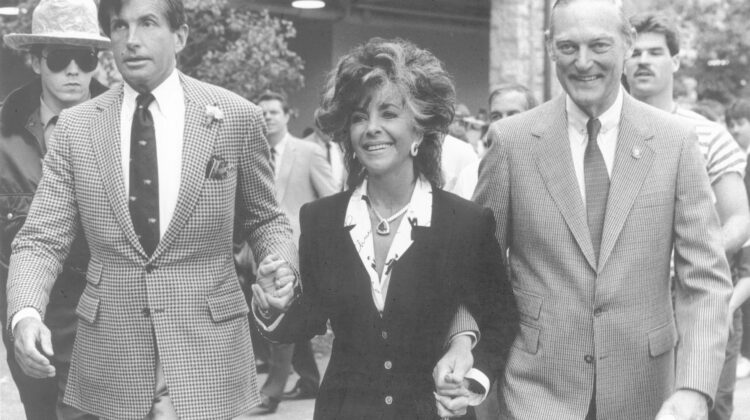
Keeneland’s iconic leader Ted Bassett dies at 103
Keeneland news release (above: Ted Bassett, left, with George Hamilton and Elizabeth Taylor at Keeneland in 1986. Bill Straus/Keeneland photo)
LEXINGTON, KY (Jan. 24, 2025) – James E. “Ted” Bassett III, who led Keeneland through historic expansion and established its position internationally as a premier race track and auction house during his 38-year tenure serving as President, Chairman and Trustee, died Thursday at his home in Lexington. He was 103. Affectionately known as “Mr. B.,” Mr. Bassett devoted his life to bettering the global Thoroughbred industry and his beloved Central Kentucky community, and his engaging demeanor and graciousness endeared him to everyone he met.
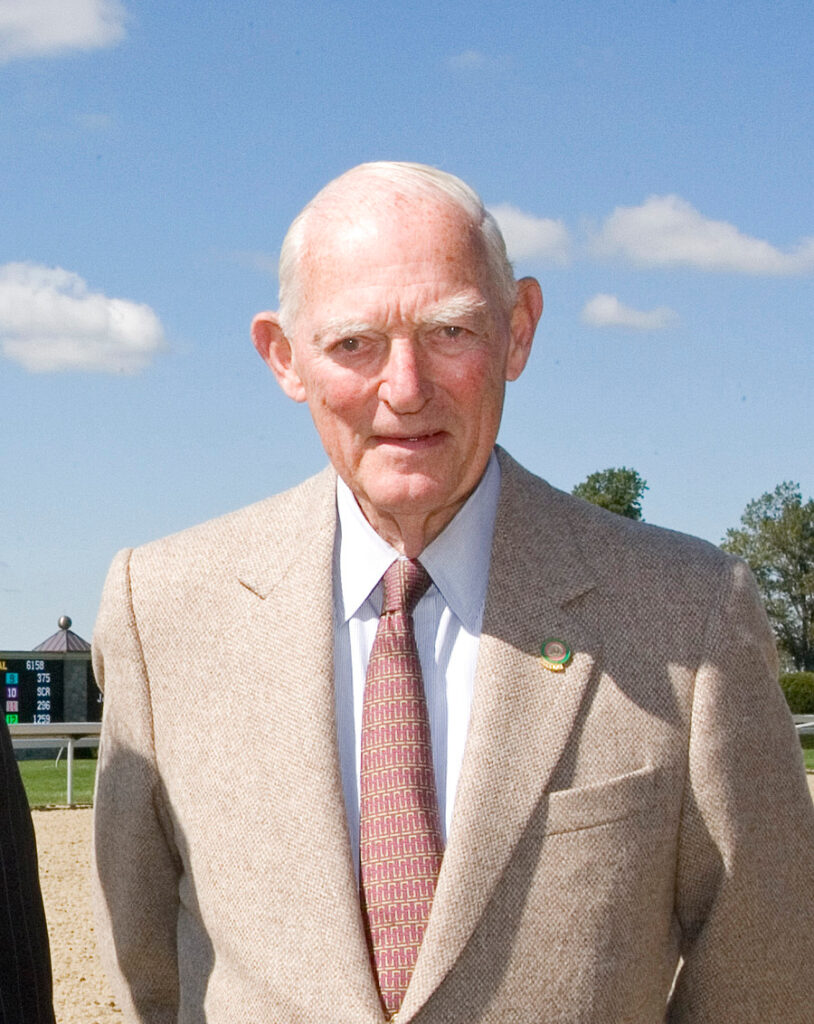
“Mr. Bassett was a cherished member of the Keeneland family, and while we are saddened by his passing we celebrate his remarkable life and indomitable spirit,” Keeneland President and CEO Shannon Arvin said. “He was the embodiment of class and integrity, and his commitment to preserving Keeneland’s mission and brand, often during challenging times in history, enabled our racing and sales operations to soar to new heights and set the standard for the industry.
“Mr. Bassett was a giant internationally as a leader, visionary, philanthropist, beloved icon and friend, and one of our sport’s greatest ambassadors,” Arvin said. “Though I have no doubt he would want most to be remembered as a humble man who worked every day to enhance Keeneland, the Thoroughbred industry and his hometown of Lexington.”
In 1968, Bassett joined Keeneland as an assistant to then-President Louis Lee Haggin II, and he began his 16-year tenure as President of Keeneland Association in 1970. Bassett became Chairman of the Keeneland Board of Directors in 1986, a Trustee in 2001 and a Trustee Emeritus in 2006.
Though he had no prior Thoroughbred industry experience, Bassett credited his Marine background for giving him the perseverance and resourcefulness to succeed at the helm of one of the industry’s foremost players on the global stage.
He undertook a series of multimillion-dollar construction and capital projects at Keeneland that spanned a decade between the mid-1970s-1980s and improved every aspect of operations: renovation and expansion of the Clubhouse and Grandstand, new admission gates and dining rooms, increased parking, development of the Training Center on Rice Road, renovation of the training track, new barns in the stable area, the addition of all-weather saddling stalls in the Paddock, enhancements to the Sales Pavilion and construction of an enclosed back ring and installation of the famous Keeneland hedges.
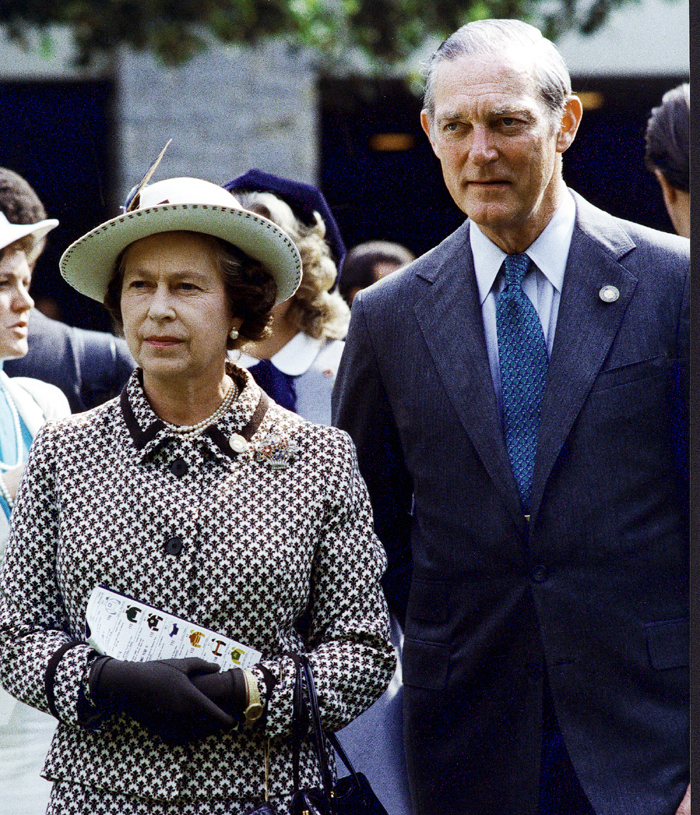
He was a longtime champion of Keeneland Library, and was instrumental in creating its world-renowned collections, research, preservation and outreach facility.
Under Bassett’s watch, Keeneland grew from a small, local track to one of the most prominent racing facilities in North America and a destination for fans around the world. In 1985, Keeneland became the first Kentucky track to conduct turf racing. The track also became a national leader in employing the latest technology regarding tote and wagering systems.
Keeneland’s sales experienced explosive growth with Bassett at the helm, becoming the world’s premier auction house and attracting major buyers from around the world. Keeneland sold Canadian Bound for $1.5 million in 1976 to become the world’s first million-dollar Thoroughbred yearling and sold Snaafi Dancer for $10.2 million in 1983 to become the first yearling to bring eight figures.
Meanwhile, Bassett welcomed many famous guests to Keeneland that included then-California Gov. Ronald Reagan in 1969, Queen Elizabeth II in 1984 and actors Elizabeth Taylor and George Hamilton in 1986.
Bassett’s contributions to the horse industry are unmatched. Among the positions he held during his long and distinguished career are president of Breeders’ Cup Ltd. and Thoroughbred Racing Associations of America; Chairman of Equibase; founding Chairman of the Kentucky Horse Park; trustee of the National Museum of Racing and Hall of Fame and a Steward of The Jockey Club.
In 1996, Bassett received an Eclipse Award of Merit in recognition of his lifelong service to the Thoroughbred industry, and in 1998 he was presented the Lord Derby Award from the Horserace Writers and Photographers Association in England.
In 2019, Basssett was selected for induction into the Racing Hall of Fame as a group recognized as Pillars of the Turf. The category honors people who have made extraordinary contributions to Thoroughbred racing at the highest national level. Candidates must be deemed to have represented the sport with indisputable standards of integrity and commitment through disciplines such as breeding and ownership, leadership, innovation, philanthropy, promotion and education.
Bassett also steered significant fundraising efforts for many worthy causes inside and outside the horse industry in Central Kentucky, and his influence on both will be felt for generations to come.
In 1984, he teamed with influential equine industry representatives to support establishment of the now internationally renowned Maxwell Gluck Equine Research Center at the University of Kentucky, with Keeneland pledging $1 million toward the effort.
Bassett also helped raise $2.7 million to acquire the Calumet Farm Trophy Collection and prevent it from being auctioned after the legendary farm declared bankruptcy. The collection is housed at the Kentucky Horse Park’s International Museum of the Horse, which honored Bassett with an exhibit of his life in 2014.
Bassett was a pivotal figure in Lexington, and his love for the community inspired his tireless work to improve the quality of life in the Bluegrass.
“How fortunate we are to live in Central Kentucky,” he said during his Life’s Work Oral History Project interview. “Not only is it the beauty of the place but the beauty of the people. The people in Central Kentucky are kind and caring.”
Bassett led efforts to build two YMCA facilities in Lexington and upgrade the longstanding facility on High Street. He also championed construction of a new Kentucky Blood Center in Lexington.
In later years, he spearheaded the initiative to honor Sergeant Reckless, a horse who carried ammunition for the Marines during the Korean War, with a statue at the Kentucky Horse Park.
Born Oct. 26, 1921, in Lexington, Bassett graduated from the prestigious Kent School in Connecticut and Yale University. He served as a Marine infantry officer during World War II, which he described as a “life-changing experience,” and participated in the initial landing by Allied forces on Japan. He sustained injuries to his hand and knee during a tour in Okinawa, Japan, that led to two Purple Hearts for his service. He also earned the U.S. Marine Corps Semper Fidelis Award in 1990, the Department of the Navy Superior Public Service Award in 2007 and the Congressional Medal of Honor Society Distinguished Citizen Award in 2011.
Bassett met his wife, Lucy Gay (who died May 1, 2016), at her graduation party in Lexington in 1946. Her father, A.B. “Gus” Gay, was a founding member of the Keeneland Association and a Keeneland Director for 48 years.
He and Lucy wed Dec. 2, 1950, and made their home in New York City, where Bassett worked as a newsprint salesman for the Great Northern Paper Company. The couple moved back to Kentucky in 1954 to reside at her family’s Lanark Farm, and he took up tobacco farming for three years. (Lucy Bassett was an accomplished Thoroughbred breeder, who bred 10 stakes winners, including 2003 Breeders’ Cup Distaff [G1] winner Adoration and Ma’am, dam of 2024 Kentucky Derby-G1 winner Mystik Dan.)
Bassett is survived by his sister-in-law, Anne Pinckney Gay; nephew James Edward “Ted” Gay (Alyson); nieces Elizabeth Gay Freeman (George), Charlotte Gay Stites (John Clay) and Anne Gay Donworth and many great nephews and nieces.
Kentucky state government was Bassett’s next venture when he became deputy director of public safety and then director of state police in the tumultuous 1960s. Public support for law enforcement had waned, but Bassett gave the state police a new image, changing both the force’s uniforms and the way they were viewed by the public. He eliminated political promotions, doubled starting salaries, expanded training with the police academy, established Trooper Island Kids’ Camp and began what would become Eastern Kentucky University’s College of Justice and Safety.
In addition to his earned degree from Yale University, Bassett received honorary degrees from Eastern Kentucky University, Transylvania University (which in 2015 named a dorm after him) and the University of Kentucky.
Bassett collaborated with award-winning writer Bill Mooney on a book titled Keeneland’s Ted Bassett: My Life that was published in 2009.
Bassett remained active well into his 90s and beyond: working daily in a cottage on the Keeneland grounds; enjoying breakfast and companionship at the Track Kitchen; sitting for an interview as part of Keeneland Library’s Life’s Work Oral History Project; narrating a moving Keeneland commercial titled “Life’s Work;” and receiving the 2023 Pinkerton Vision Award from Midway University.
Arrangements for Mr. Bassett are pending.




